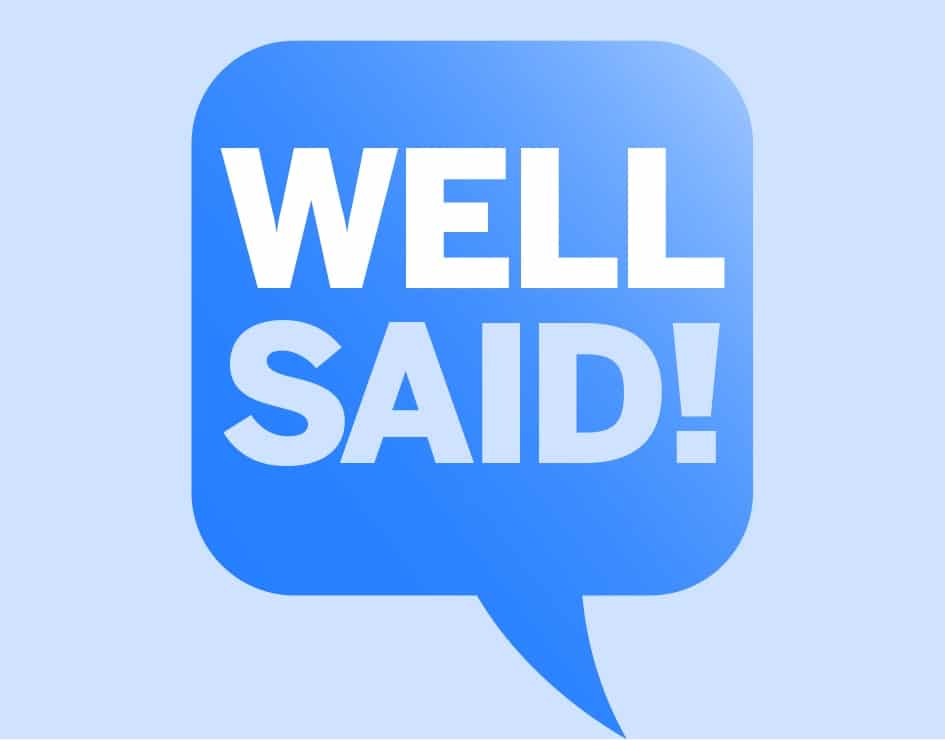Last October, I posted advice in this space on how to extricate yourself gracefully from unwelcome conversations at networking events. Recently, a reader asked how to handle the reverse situation: when you’re the one being ditched. (I’ll belatedly label the previous post Part One; think of this as a delayed Part Two. It will make more sense if you read Part One.)
Hopefully, it’s rare, but we’ve all experienced that non sequitur when someone with whom we’re chatting suddenly must attend to something, right now, and it hits us: “OMG! They’re trying to end the conversation and get away from me!”
The solution, as with most problems, lies in its origins. In the previous article, we identified some causes of finding ourselves in conversation with the wrong person. I’ve expanded that list below, but here’s the basic causal framework:
No purpose = Wrong event = Wrong people = Irrelevance = Must escape
No concrete purpose for attending this event. This is a common problem for those whose goal is to initiate relationships with almost anyone, due to the misguided belief that all relationships are potentially beneficial. When you’re indiscriminate, you’re driven to satisfy a selfish need. Unless you happen to be talking with someone who has the same vague purpose as you, this approach raises the odds of being at the …
Wrong event. It’s said that, absent a clear destination, any road is as good as another. Without a clear purpose, you don’t know who you’re trying to locate, and you’re at risk of choosing events for their availability or convenience. You’re also more likely to choose broadly attended events rather than those focused on an industry or issue. You’ll be surrounded by the …
Wrong people. With no common factor guiding the choice of event, statistically you’re likely to experience a high percentage of people who are unlikely to be prospective clients or able to refer you to such. In that environment, you’re almost guaranteed to experience …
Irrelevance. Without a clear purpose, at an event populated by people unconnected to your interests, you’re talking just to talk. Again, you’re unlikely to match interests with many. I’ll grant that there’s probably a small percentage of networkers who are able to be genuinely interested in everyone they meet. However, most people go to networking events to further a business purpose, and they aren’t interested in meeting just anyone. You represent …
Filtering overhead. Your irrelevance usually won’t be immediately apparent. Plus, we’re obligated to begin with a little innocuous warm-up chat. It can take more than a few minutes of probing to recognize that there’s no “there” there. You’re both eating up time unmasking the “no point” hidden under the “nice person.” However, clarity triggers the “Escape!” response.
This is the common, and relatively benign, causal chain that results in someone plotting their escape. I say “benign” because you’re not doing anything to offend, you’re just not a match. If you encounter the person elsewhere, they won’t shun you.
The greater risk is when we are a match, and we overplay our conversational hand in the following ways that we have to be aware of and assiduously avoid.
Monopolization. This has many causes, including genuine enthusiasm, but the one to watch out for is what sociologist Charles Derber has termed “conversational narcissism.” Derber observes that, “during a conversation, each person makes initiatives. These initiatives can either be attention-giving or attention-getting. Conversational narcissists concentrate more on the latter because they’re focused on gratifying their own needs.”
No timer in your head. Networking events are for quick connections and next steps, not deep conversations. People go to meet people, plural, not a person. They’re for exploring mutual business interests, not investing in deep friendships. Nobody should spend a lot of time with any one person, no matter how interesting or opportune the connection may seem. If the opportunity is genuine, it will be just as genuine a few days from now in the right setting. You need a timer in your head that pings you after a few minutes.
It can be hard to know the limits. NPR radio host Marty Nemko suggests a “traffic light” framework:
- You get a green light during the first 20 seconds. “Your listener is liking you, as long as your statement is relevant to the conversation and hopefully in service of the other person.”
- Yellow light for the next 20 seconds. “Now the risk is increasing that the other person is beginning to lose interest or think you’re long-winded.”
- At the 40-second mark, your light is red. “Yes, there’s an occasional time you want to run that red light and keep talking, but the vast majority of the time, you’d better stop or you’re in danger.”
A minute is longer than you think, particularly if you’re the person waiting for it to end. You always want to be the one to disengage.
Ignoring cues. Sometimes, we keep on talking because we’re truly engaged in the topic and person. Others try to save us from ourselves, offering cues that they want to say something, or they want to leave, but we don’t notice, and they feel stuck.
Can you see how a combination of these could easily trigger a flight response?
How Do We Recognize It’s Time to Wrap Up?
Writing in Harvard Business Review, Dorie Clark, author of Stand Out, and an instructor at Duke University’s Fuqua School of Business, suggests that we “make sure to be alert to the movement of their eyes from your face to their phone or watch to check the time. Glance down at their feet to see if they are still facing towards you.”
If they’re not, she says, “it’s a sure sign they want to move on.”
Don’t take it personally, she writes. “They may simply need to head to the restroom, and you don’t want to tarnish an encounter by having them think of you as the person they couldn’t get away from.”
The biggest escape trigger is irrelevance, which is easily avoided by these simple steps:
- Define a clear purpose, driven by the Door-Opener problem that drives demand for your service.
- Profile those whose interest aligns with yours.
- Choose to attend only events populated with people who match that profile.
- Provide a filter. Make it easy for others to assess your relevance quickly. When you introduce yourself, identify what impact you produce, and for whom. “I help business lawyers create the right kind of sales opportunities, and convert them into the right kind of clients.”
If, despite your best efforts to be relevant and sensitive, you’ve still managed to overstay your conversational welcome, how do you facilitate the other person’s escape in a way that minimizes their discomfort, and preserves a shred of dignity?
First, acknowledge the faux pas. “I’m sorry to have gone on so long. I let my passion for [the topic] overcome my manners. You’re here to meet people, and I’m preventing that. Please excuse me.” You’ve blown it; shake hands and make yourself scarce. If they offer you an olive branch, say that if they’re in a forgiving mood, you actually do want to hear their views when it’s convenient.
The questioner who triggered this Part Two also asked how to do this in a way that preserves our opportunity for follow-up. The only way to do that is to not let it happen. If someone had to escape from us, they’re unlikely to want another dose. However, if their interest in the issue was real, and your remarks were of value to them, they may offer you another chance, and some continuity, “Oh, don’t worry. I respect your passion and knowledge. I do have to get moving now, but I’m open to exploring this further in a better setting.”
Other than that, it’s a loss. Chalk it up to the cost of experience, and a lesson you’ll likely remember.
Illustration ©iStockPhoto.com

















